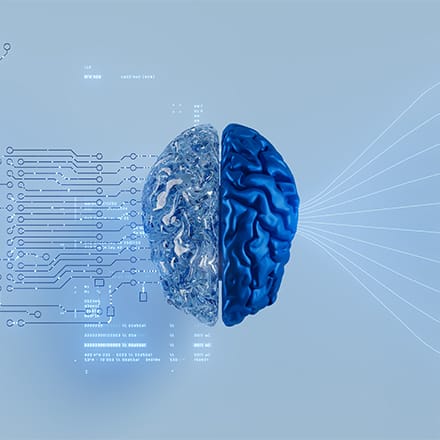What Does a Data Analyst Do?

Understanding the numbers
When reviewing job growth and salary information, it’s important to remember that actual numbers can vary due to many different factors—like years of experience in the role, industry of employment, geographic location, worker skill and economic conditions. Cited projections are based on Bureau of Labor Statistics data, not on SNHU graduate outcomes, and do not guarantee actual salary or job growth.
In today's technology-driven world, data is collected, analyzed and interpreted to solve a wide range of business problems. With a career as a data analyst, you could play a decisive role in the growth and success of an organization.
A data analyst is a lot more than a number cruncher. Analysts review data and determine how to solve problems using that data, and learn critical insights about a business's customers and boost profits. Analysts also communicate this information with key stakeholders, including company leadership.
 "Ultimately, the work of a data analyst provides insights to the organization that can transform how the business moves forward and grows successfully," said Dr. Susan McKenzie, senior associate dean of STEM programs and faculty at Southern New Hampshire University (SNHU).
"Ultimately, the work of a data analyst provides insights to the organization that can transform how the business moves forward and grows successfully," said Dr. Susan McKenzie, senior associate dean of STEM programs and faculty at Southern New Hampshire University (SNHU).
McKenzie earned a Doctor of Education (EdD) in Educational Leadership from SNHU, where she also serves as a member of the Sustainability Community of Practice. Throughout her career, she's focused on reducing the barriers that inhibit the learning and application of math and science.
If you're interested in becoming a data analyst, it's essential to understand the day-to-day work of an analytics professional and how to prepare for a successful career in this growing field.*
What is a Data Analyst?
 Data analysts play a vital role in a modern company, helping to reflect on its work and customer base, determining how these factors have affected profits and advising leadership on ways to move forward to grow the business.
Data analysts play a vital role in a modern company, helping to reflect on its work and customer base, determining how these factors have affected profits and advising leadership on ways to move forward to grow the business.
"Data analysts are the modern-day detectives of the business world," said Jason Eborn '17MBA, PMP, an adjunct instructor at SNHU who began his career in data analysis, technology and project management.
He said data analysts:
- Inform strategic decision-making
- Measure and improve performance
- Optimize operations
- Uncover hidden patterns and trends
- Understand customers better
Essentially, their ability to draw "actionable intelligence" from raw data, according to Eborn, helps organizations succeed. In addition to teaching at SNHU, Eborn leads a team of consultants for an educational technology company.
What Are the Responsibilities of a Data Analyst?
 As a data analyst, you can collect data using software, surveys and other data collection tools, perform statistic analyses on data and interpret information gathered to inform critical business decisions, McKenzie said.
As a data analyst, you can collect data using software, surveys and other data collection tools, perform statistic analyses on data and interpret information gathered to inform critical business decisions, McKenzie said.
For example, a data analyst might review the demographics of visitors who clicked on a specific advertising campaign on a company's website. This data could then be used to check whether the campaign is reaching its target audience, how well the campaign is working and whether money should be spent on this type of advertising again.
Exactly what a data analyst does can also depend on where they work and the role they are filling. Large amounts of data are becoming increasingly accessible to even small businesses, putting analysts in demand across a wide variety of organizations.*
For example, according to the U.S. Bureau of Labor Statistics (BLS), operations research analysts, a type of data analyst, held 123,300 jobs in 2023, with an additional 28,300 expected to be added by 2033.* That's a projected growth of 23% for this role.*
Another type — market research analysts — held 903,400 jobs in 2023, BLS reported, with an estimated 74,900 jobs to be added by 2033.*
Many organizations have even created information analyst teams, with data-focused roles including database administrators, data scientists, data architects, database managers, data engineers, and, of course, data analysts, McKenzie said.
"Data analysts are in high demand across many industries and fields as data has become a very large component of every business," said McKenzie.* "The undergraduate degree in data analytics provides an entry place into many of these careers, depending on the skills of the individual."
What Skills Are Needed for a Data Analyst?
Successful data analysts have strong mathematical and statistical skills, according to McKenzie, as well as:
- Analytical skills to gather, view and analyze information
- Numerical skills to measure and statistically analyze data
- Technical skills, including software and scripting languages, to organize and present data
McKenzie said that data analysts also require a strong foundation of business knowledge and professional skills, from decision-making and problem-solving to communication and time management.
Curiosity and attention to detail are also essential data analyst skills, according to Eborn, as they can help uncover patterns in data with accuracy.
"Becoming a successful data analyst requires a combination of technical skills, soft skills and a passion for data," he said. "By focusing on these areas and staying curious, you can build a rewarding career in this dynamic field."
Plus, with the constant changes in technology, staying up to date is important. Eborn recommended following the trends and new technologies relating to cloud computing, big data, data storytelling and ethics.
Read more: What Are Data Analysis Skills? Quantitative and Qualitative Examples
Is Data Analytics a Stressful Job?
Between the constant evolution of data analytics and its central role in all kinds of industries, you might want to know if a job in data analysis is stressful.
As with any career, there are aspects to the field that can cause stress, but there are also ways to navigate them. According to Brian Letort, an SNHU adjunct instructor and the head of a corporate data office and platform AI team, these stressors and solutions include:
- Large volumes of data. "Handling large data sets can be daunting, but leveraging automation tools and maintaining a well-organized workflow can streamline the process," Letort said.
- Necessity to deliver accurate insights. "The pressure of delivering accurate results can be mitigated by implementing robust quality control measures, such as regular data validation and peer reviews," Letort said.
- Tight deadlines. "It's important for analysts to prioritize tasks and break down complex projects into manageable steps, ensuring consistent progress without becoming overwhelmed," Letort said.
At the end of the day, he said open communication is key to managing expectations and timeframes in this type of work.
How to Become a Data Analyst
No matter what your specific interests are in the data analytics world, you'll probably need a bachelor's degree to get started in the field. While many people begin a data analytics career with a degree in mathematics, statistics or economics, data analytics degrees are becoming more common and can help set you apart in this field, according to McKenzie.
With the help of a specialized degree, you have the opportunity to hone the skills needed in a society with increasing amounts of data, McKenzie said.
An associate degree in data analytics is a great way to get your foot in the door. You'll learn what data analytics is and fundamentals such as identifying organizational problems and using data analytics to respond to them. Associate degrees are typically 60 credits long, and all 60 of those credits can be applied toward a bachelor's in data analytics.
You may be able to transfer previously earned credits into a degree program, too.
 Jason Greenwood '21 transferred 36 credits from schooling that he did over 30 years ago into a bachelor's in data analytics program.
Jason Greenwood '21 transferred 36 credits from schooling that he did over 30 years ago into a bachelor's in data analytics program.
"I was really happy that as many credits transferred as they did, as it helped decrease what I needed to take from a course perspective," he said.
Greenwood earned his data analytics degree from SNHU to pair with his experience working in the Information Technology (IT) field.
"Even though I had a successful IT career — I had managed it without a degree — (that) 'gap' in my foundations always bothered me," Greenwood said.
According to Greenwood, he was always interested in data, and his career focused increasingly on data movement and storage over the last decade. "The chance to learn about the analysis of that data felt like 'completing the journey' for me," he said.
In a data analytics bachelor's degree program, you may explore business, information technology and mathematics while also focusing on data mining, simulation and optimization. You can also:
- Explore how to examine data for relevant information
- Gain hands-on practice collecting and organizing information from many sources
- Learn to identify and define data challenges across industries
Pursuing a degree in data analytics can prepare you to use statistical analysis, simulation and optimization to analyze and apply data to real-world situations and use the data to inform decision-makers in an organization.
![]() Some universities also offer concentrations to help make your degree more specialized. At SNHU, for example, you can earn a concentration in project management for STEM to help you develop skills that may be useful for managing analytical projects and teams effectively.
Some universities also offer concentrations to help make your degree more specialized. At SNHU, for example, you can earn a concentration in project management for STEM to help you develop skills that may be useful for managing analytical projects and teams effectively.
A master's in data analytics can further develop your skills, exploring how to use data to make predictions and how data relates to risk management. In addition, you'll dive deeper into data-driven decision-making, explore project management and develop communication and leadership skills.
Read more: How to Become a Data Analyst
Is Data Analytics Hard to Learn?
There's a lot to learn when it comes to data analytics — from technical knowledge to business acumen and all the soft skills in between, but there are also many opportunities available to help you build the foundations and grow as a professional.
 These opportunities include online courses, bootcamps and degree programs, according to Letort.
These opportunities include online courses, bootcamps and degree programs, according to Letort.
Bringing 20+ years of data and engineering experience to the classroom, Letort said he especially enjoys teaching the last course of SNHU's master's in data analytics program, where he can help students as they prepare to make moves in their careers.
"Having navigated the field in its early days with little guidance, I find great satisfaction in mentoring students and engaging in reverse mentoring, especially as the field continues to evolve so rapidly," he said.
If you lack experience in the field, Letort recommends learning skills in:
- Data visualization
- Statistical analysis
- Programming languages such as Python and R
- Tools such as Excel and SQL
To avoid feeling overwhelmed, Letort recommended focusing on one area at a time — and that interest can go a long way.
"It’s important for aspiring data analysts to demonstrate their passion for data by continuously learning and staying updated on industry trends and tools," he said.
Finding an internship during your studies can give you hands-on experience that can help you stand out when applying for data analyst jobs, McKenzie said. Joining industry associations for data analytics, statistics and operations research can also provide key networking opportunities that may help grow your career.
Find Your Program
Data Analyst vs. Data Scientist
![]() Data analysts play a unique role among the many data-focused jobs often found in today's businesses. Although the terms data analyst and data scientist are often used interchangeably, the roles differ significantly.
Data analysts play a unique role among the many data-focused jobs often found in today's businesses. Although the terms data analyst and data scientist are often used interchangeably, the roles differ significantly.
So, what's the difference between data science and data analytics?
While a data analyst gathers and analyzes data, a data scientist develops statistical models and uses the scientific method to explain the data and make predictions, according to McKenzie. She used an example of weather indicators. While a data analyst might gather temperature, barometric pressure and humidity, a data scientist could use that data to predict whether a hurricane might be forming.
"They're looking at the data to identify patterns and to decide scientifically what the result is," she said. "The data analyst works on a subset of what the data scientist does."
McKenzie said that data scientists generally have to earn a master's degree, while data analysts typically need a bachelor's degree for that role.
Is Data Analytics a Good Career?
One of the perks of working in data analytics is that it's here to stay. "Data analysts play a crucial role in modern industries, often being referred to as the modern knowledge workers," Letort said.
As technology advances and more of our lives are spent online, higher-quality data is getting easier to collect, encouraging more organizations to get on board with data analytics.
Some of the latest trends Letort has observed in the field include:
- Demand for real-time analytics
- Focus on data ethics and privacy
- Integration of AI and machine learning
- Push for data democratization for non-technical stakeholders
Within a data analytics career, you may get to play an instrumental role in the future of an organization, empowering it to grow and innovate, according to Letort. Since there are so many directions you can take a data career in, he recommended finding and following the areas that interest you and best align with your goals.
Discover more about SNHU's bachelor's in data analytics: Find out what courses you'll take, skills you'll learn and how to request information about the program.
*Cited job growth projections may not reflect local and/or short-term economic or job conditions and do not guarantee actual job growth. Actual salaries and/or earning potential may be the result of a combination of factors including, but not limited to: years of experience, industry of employment, geographic location, and worker skill.
Danielle Gagnon is a freelance writer focused on higher education. She started her career working as an education reporter for a daily newspaper in New Hampshire, where she reported on local schools and education policy. Gagnon served as the communications manager for a private school in Boston, MA before later starting her freelance writing career. Today, she continues to share her passion for education as a writer for Southern New Hampshire University. Connect with her on LinkedIn.
Explore more content like this article

How to Get Into AI: What AI at Work Looks Like for Beginners

Understanding AI Ethics: Issues, Principles and Practices

What is the Best Degree for an Artificial Intelligence Career?
About Southern New Hampshire University

SNHU is a nonprofit, accredited university with a mission to make high-quality education more accessible and affordable for everyone.
Founded in 1932, and online since 1995, we’ve helped countless students reach their goals with flexible, career-focused programs. Our 300-acre campus in Manchester, NH is home to over 3,000 students, and we serve over 135,000 students online. Visit our about SNHU page to learn more about our mission, accreditations, leadership team, national recognitions and awards.


